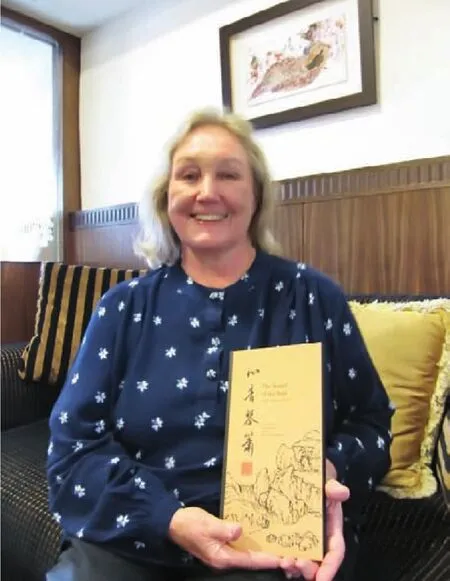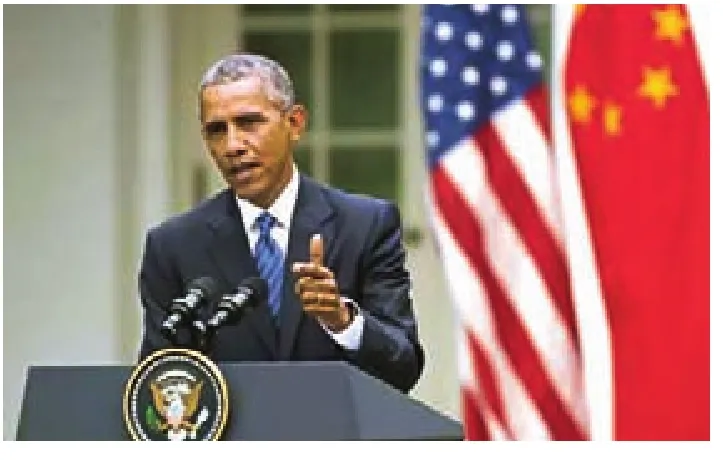瑞典汉学家林西莉的古琴情缘:中国文化将长存于世
By Sun Ye
瑞典汉学家林西莉的古琴情缘:中国文化将长存于世
Timeless Tunes
By Sun Ye

林西莉女士手捧由她担任专辑策划人,由大陆古琴演奏家邓鸿及箫演奏家陈莎莎所演奏的古琴专辑——《心音琴箫》
20世纪60年代早期,林西莉师从几位顶级大师,在北京学习中国传统乐器——古琴。这段教育经历使她能够在国际舞台上向听众介绍古琴独特的声音。
Cecilia Lindqvist studied guqin, a Chinese zither, under some of the best masters of the instrument in Beijing in the early 1960s. It was an education that allowed her introduce the guqin’s unique sounds to audiences on the international stage.
年长者已到临终之时,最后一次见面,两位50年的老朋友聊起了七弦琴——古琴。
When the two friends of some 50 years saw each other for the lasttime, at the older woman’s deathbed, they spoke about a sevenstring plucked instrument, guqin.
“她的最后一个问题是,‘关于这种乐器你还想知道点什么呢?’”82岁的瑞典汉学家林西莉回忆着2005年冬日午后的那次会面,泪水涌出双眼。她的良师益友王迪4天后去世。
“Her final question was,’Is there anything you’d want to know about the instrument?’” recalls 82-year-old Swedish Sinologist Cecilia Lindqvist of that 2005 meeting on a wintry afternoon, tears welling in her eyes. Her friend and instructor, Wang Di, passed away four days later.
作为她们最终的话题,没有什么比古琴更合适。这种拥有4000年历史的乐器让她们相会,而学习古琴也成为了林西莉一生的专注。
林西莉,瑞中协会前主席,斯德哥尔摩大学教授,北京语言文化大学教授。她的书《古琴》于王迪去世几个月后写作完成。
It’s only appropriate that the final subject the two friends spokeabout would be guqin, the 4,000 year-old instrument that brought them together and has been the focus of Lindqvist’s lifelong study.
林西莉的书在2006年出版后很快赢得了瑞典最大的文学奖项——奥古斯特奖。这本书将古琴音乐描述为“文明的命运,情感和梦想”,这本书已经加入中国中学生的必读清单。今年春天,修订后的第二版将问世。
Lindqvist, former chair of the Sweden-China Association and professor of Stockholm University and Beijing Language and Culture University, finished writing her book, Qin, several months later. The book was released in 2006 and promptly won one of Sweden’s biggest literary prizes, the August Award. The book details guqin music as well as “civilization’s fate, feelings and dreams”and recently was added to the required reading list for Chinese middle-school students. Its revised second-edition is due out this spring.
林西莉师从瑞典著名汉学家高本汉,精通钢琴、鲁特琴和多种语言。她在28岁这一年来到中国,寻找不一样的音乐。“贝多芬那样的西方音乐过于阳刚。”林西莉这样说。
Lindqvist, student of famed Swedish Sinologist Klas Bernhard Johannes Karlgren, who is well-versed in piano, lute and several languages, came to China at the age of 28 in search of a different kind of music. “Western music, like Beethoven, is too masculine.”she says.
那是1961年,“全世界的无产者联合起来!”还是北京大学的语言课的例句。那是困难时期,林西莉靠滴注蛋白维持体力,而其他大学生则要剥食树皮。
It was 1961, and her Peking University language classes were still taught with “Proletariat around the world, unite!” as example sentences. Times were so bad that she had to sustain herself on intravenous drips of protein while the rest of the university students peeled twigs off trees for food.
但她感谢接下来的两年,在北京古琴研究会度过的这两年在她的记忆中是“美好的时光”。研究会的庭院里住着全国最有名的古琴演奏者。当时年近40的王迪成为了她的老师。
But she would be grateful for the following two years and remember them as “wonderful times”,as she spent them at the Guqin Research Center, a courtyard that housed the country’s most celebrated guqin players. Wang Di, who was then in her late 30s, became her instructor.
林西莉爱上了古琴。空灵清澈,百转千回,琴声“包容万物,如此丰富,令人沉醉”。
Lindqvist fell for the guqin, whose sounds are “a combination of absolutely fascinating rich mixture” that run from airy twinkling to dithering tomes.
古琴不仅仅是一种异国的乐器。
But it’s not just another exotic instrument.
没有标准教程,也没有练习曲。林西莉的学习开始于100首尚存于世的古曲。她在学琴之前必须沐浴。和弦甚少,乐谱上也不标明拍子。古琴的精髓在于智,关乎理想中的高贵品质和优雅举止。古琴是大智者的表达。
There are no scales or etudes to get used to. One starts with one of 100 tunes that still exist. One has to take a bath before playing. There are rarely any chords. The scores have no marked tempo.
林西莉说,王迪教过她,“(古琴)音乐是开放内心、联系自然的方式。”她说王迪对于西方音乐的刻板和实用主义“感到遗憾”。
The essence is the mentality, the ideals of noble characters and graceful bearing. It’s the expression of upper-class scholars.
“我开始明白,这就是不同的(音乐),”林西莉说,“(这种音乐)关乎内心的平静,关乎生命和自然的一切。”
Lindqvist says Wang taught her that “(Guqin) music is a way to get your heart to open and connect with nature”. She says Wang“felt sorry” about the stringent and practical Western ways.
在她们坐下来演奏之前,王迪会讲解和曲子有关的故事、曲子的气质以及背后精深的礼仪。传统意义上,古琴是由古代智者演奏,用于表达自我的。最有名的古琴曲大都经历了好几代人的传承。为了演奏出原作者的真意,了解音乐背后的心境、情感和历史非常重要。
“I began to understand that this is something else,” Lindqvist says,“It’s for your inner peace, it’s for all the things in life and nature.”
林西莉将把古琴的故事继续讲下去,讲给全世界听。
Before they sat down to play, Wang would tell the stories, temperaments and scholarly manners behind the tune. Guqin was traditionally played by scholars in ancient times to express themselves. Most renowned guqin tunes have been handed down through the generations. To play them as the original composer intended, it is important to know the mood, feeling and history behind the music.
作为古琴研究中心第一个、也是唯一一个学生,林西莉离开时收到了几位古琴大师一同赠送的独特礼物——20首古琴曲的演奏录音,演奏者皆为大家,其中包括管
Lindqvist would continue to tell the stories of the guqin all over the world.平湖、查阜西和溥雪斋,他们的音乐曾被送往外太空。这是一份令她无法忘怀的礼物。
回到家乡,林西莉开始教书。她教授的内容包括文学、历史和汉语。在她的努力下,汉语于1971年融入瑞典教育系统。她为学艺术史的学生播放那独特的送别礼物,直到唱片丢失。唱片去年被找到,内容已经被收录在《古琴》中。
As the first and only student at the research center, the master guqin players banded together to present her with a one-of-a-kind farewell gift, a live recording of some 20 tunes played by the masters (among them Guan Pinghu, Zha Fuxi and Fu Xuezhai, whose music was sent to space on the Voyager) so that she wouldn’t forget.
这本书是林西莉献给老师的礼物,为此她付出了15年的探索。
When she returned home to teach (she has been teaching literature, history and Chinese, incorporating the latter into the Swedish school system in 1971), she played the disc to her art history students until she lost it. The disc was found last year, and was included in Qin. The book, which she spent 15 years researching, was a tribute to her teachers.
这本书也是给未来一代的记录。“(在20世纪90年代)开始写这本书的时候,我坚信古琴会失传,因为那时没有人学古琴。”林西莉这样说。
It was also a document for future generations. “When I wrote the book (in the 1990s) I was absolutely sure guqin will never survive, because nobody was studying it.” she says.
现在,她不再这样想,而是相信古琴能够长存。这不只是因为古琴成为了世界非物质文化遗产项目,也因为很多人正和她一样积极地将这项艺术推向世界,因为古琴有一种永驻的力量,能够经受住时间。
Now, she has changed her mind and is convinced the instrument will last. Not only because it became a World Intangible Cultural Heritage item and many others like her are actively promoting the art worldwide, but also because it has a staying power that withstands the test of time.
故宫博物院的古琴学者郑珉中给林西莉看了10架古琴。其中多数高贵、美丽、历史悠久,和林西莉的明代古琴一样经历了百年风云。不过有一架好琴是新琴。“想想吧,这在500年之内都是极为了不起的。” 郑珉中这样说。
Zheng Minzhong, the guqin scholar of the Palace Museum recently brought 10 guqin for Lindqvist to see. Most of them were – much like her own Ming Dynasty (1368-1644) instrument - regal,historical, beautiful and rich with hundred of years of experiences.
“这太触动人了,”林西莉轻叹,“我们通常没有那样的眼界,不知道在我们身后几百年,一种事物会不会发展得越来越好。”
One of them is very good but new. “Imagine. In 500 years this will be absolutely marvelous.” Zheng said.
她还相信,饱经风雨的中国文化将始终如一,长存于世。
“It’s extremely moving,” Lindqvist says with a little sigh, “We don’t usually have that perspective, for something will get better and better in the hundreds of years long after we are gone.”
从20世纪70年代起,林西莉几乎每年都会为诸多和中国有关的项目来访,其中就包括她的甲骨文考古研究。她的《汉字王国》揭示了几百个汉字所经历的演变,是另一本奥古斯特奖获奖作品。林西莉参与的工作还包括关于全国各地妇女生活的电视纪录片,关于陕西剪纸的研究和关于年画的年代学研究。
She also believes that Chinese culture, with its ample share of upsand downs, will always be consistent and will live on.
She has visited China almost every year since the 1970s, for many China-related projects, including her archaeological study of oraclebone characters. China: Empire of Living Symbols, a book that uncovers the evolution of a few hundred Chinese characters, is her other August Award winner. She has also worked on TV documentaries about the life of women in various parts of the country, a study on the art of paper-cutting in Shaanxi province, a chronology of Lunar New Year posters and more.
“1961年来中国的时候,我以为那两年不过是我人生的插曲。”她说,“但我被感染了,古琴彻底改变了我。”“
I came to China in 1961, thinking the two years would only be a parenthesis in my life,” she says, “But I was caught and it fundamentally changed me.”
最近几年,她数次为古琴策划瑞典巡演,但她很少公开演奏。
In recent years she has curated several guqin concert tours in Sweden. Lindqvist seldom plays in public.
肃静之下,听众爆满。人们挤进巡演现场,为林西莉而来,为古琴曲中的故事和心境而来。琴声中有芦苇的荡漾,琴声中有橡树的沉吟。琴声从王迪的女儿邓鸿手中流出,一如40年前。
In hushed silence, listeners would fill up auditoriums to overflowing. They crammed into the venues to see Lindqvist relate the moods and stories behind the tune (from flowing reeds to the creaks of an oak), and then the guqin music would be played by Deng Hong, Wang Di’s daughter. Just as it was in the 1960s.
好评之下,巡演曲目已经录成专辑。这张专辑有一个再恰当不过的名字——心音琴箫。
The highly acclaimed tours have resulted in a studio recording. And it couldn’t be more aptlynamed.
It’s called The Sound of the Soul.
国内三大电信运营商流量不清零
Keep Your Data: China’s Cell Companies Introduce Automatic Roll-Over

国内三大电信运营商正式对外开放手机套餐内单月流量不清零业务。从10月1日起,手机用户无须申请,即可开通此项服务。开通后,套餐内的流量当月内用不完,可以转存至次月优先使用。例如,10月套餐内剩余流量可延期结转至11月底前使用,后续月份以此类推。该服务面向所有手机月套餐用户,系统默认开通该服务。这一服务措施将惠及4G /3G/2G 手机月套餐用户。
China’s three major domestic telecom operators have official introduced roll-over services for data purchased in monthly packages. Roll-over for monthly packages began on October 1. It was automatic- users do not need to subscribe. Any leftover data from one month can be used in the next month. For example, any remainder from October can be used in November. Users with 2G, 3G, and 4G packages can benefit from the new regulations.
奥巴马推“百万强”计划:2020年实现100万名美国学生学习中文
Obama’s New Program: 1 Million Americans Studying Chinese by 2020

近日,在与即将结束对美国国事访问的中国国家主席习近平召开的联合记者会上,奥巴马宣布准备启动“百万强”计划,目的是争取到2020年实现100万名美国学生学习中文。奥巴马2009年11月宣布“10万强”计划,提出到2014年派10万美国学生到中国学习。2014年7月美国宣布这一目标已经实现。现在,奥巴马又提出了一个更远大的目标,他说:“如果我们两国准备在全球各地采取更多行动,那么一个最好的开端就是学对方的语言、真正了解对方。”
U.S. President Barack Obama announced plans to launch “1 Million Strong” in a joint press conference with Chinese president Xi Jinping. The program aims to increase the number of Americans studying Chinse to one million by 2020 . In November 2009, Obama announced the “100,000 Strong”program which aimed to send 100,000 Americans to China to study abroad by 2014. In July 2014, the United States announced that the goal had been achieved. The new proposal is even more ambitious, but also closer to home. In the joint press conference, Obama stated that, “If our countries are going to do more together around the world, then speaking each other’s language, truly understanding each other, is a good place to start.”
杭州获2022年亚运会举办权
Hangzhou Wins (Uncontested) 2022 Asian Games Bid

近日,在土库曼斯坦阿什哈巴德第34届代表大会上,亚奥理事会宣布杭州成为2022年亚运会举办城市。作为唯一申办城市,亚奥理事会还是根据规则,在杭州申办代表团陈述后进行表决,在获得亚奥理事会45个会员中半数以上的票数后,杭州成功获得2022年亚运会举办权。杭州成为继北京和广州之后,中国第三个举办亚运会的城市。
Hangzhou has been officially confirmed as the host of the 2022 Asian Games. The city was the only candidate for the position, but still had to win a majority of votes of the 45 member Olympic Council of Asia.Hangzhou will be China’s third city to host the games- Beijing and Guangzhou have hosted in previous years. The decision was announced at the Olympic Council’s General Assembly meeting in Ashgabat, Turkmenistan.

